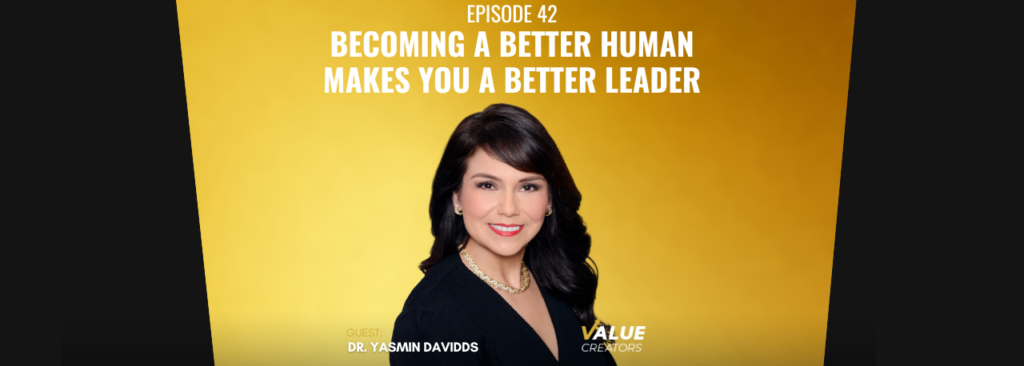Episode #42 – Yasmin Davidds on How Becoming A Better Human Makes You A Better Leader

Yasmin Davidds, president & CEO of Dr. Yasmin Davidds Leadership Institute and Multicultural Women’s Executive Leadership Institute advocates for a leadership approach called “graciously assertive,” which blends self-advocacy with empathy for others.
Dr. Yasmin outlines eight pillars crucial for effective leadership, emphasizing practical methods like gratitude lists and self-awareness exercises to foster personal growth. Central to her philosophy is “graciously assertive” communication, combining assertiveness with grace to achieve collaborative outcomes. Yasmin discusses how this approach can transform workplace dynamics, emphasizing empathy and mutual understanding in both professional and personal relationships. She also addresses challenges faced by women, particularly women of color, advocating for gratitude and empathy to navigate biases effectively. Yasmin promotes moral leadership aligned with personal values, stressing genuine inclusion and the importance of mindsets like gratitude and growth for continuous personal and professional development.
Resources:
Connect with Hunter Hastings on LinkedIn
Connect Yasmin Davidds on LinkedIn
Yasmin Davidds Website: dryasmininstitute.com
To download the book: Graciously Assertive
Show Notes:
0:00 | Intro
00:46 | Yasmin’s Point of View: Being a Better Human Being
02:37 | Graciously Assertive: Eight Pillars
04:13 | First Pillar: Self-Awareness
06:50 | Second Pillar: Social Awareness
08:23 | Third Pillar: Empathy
09:52 | Fourth Pillar: Self-Regulation
11:45 | Fifth Pillar: Self-Compassion
12:17 | Zero Tolerance for Judgement
13:37 | Most Empowering: Pillar of Gratitude
16:37 | Eight Pillar: Healthy Boundaries
18:20 | Assertive or Graciously Assertive Communication
23:45 | Empowering Women in Diverse Challenges
26:42 | Moral Leadership
30:50 | Find the Barriers and Remove Them
32:49 | Mindset
35:13 | Inclusion
38:13 | How does Yasmin teach?
40:19 | Wrap-Up
Knowledge Capsule
Leadership Approach Critique:
- Traditional Models: Criticized for their hierarchical nature, where leadership is often top-down and authoritative.
- Narcissistic Tendencies: Emphasis on assertiveness and self-promotion can sometimes lead to narcissistic behaviors, where leaders prioritize their own needs over others.
Yasmin Davidds’ Approach to Leadership:
- Better Human Approach: Focuses on personal development and self-improvement as foundational to effective leadership.
- Compassion and Understanding: Advocates for leaders to be compassionate, understanding that everyone has a unique story and perspective.
Key Pillars of Leadership:
- Self-awareness:
- Understanding Strengths and Weaknesses: Knowing one’s strengths helps leverage them, while awareness of weaknesses allows for improvement.
- Emotional Impact: Recognizing how one’s emotions influence decisions and interactions with others, fosters better self-management.
- Social awareness:
- Energy and Behavior Impact: Acknowledging how one’s mood and actions affect those around them, crucial in maintaining a positive team dynamic.
- Empathy and Adaptation: Empathizing with team members’ emotions and adjusting leadership style accordingly to foster a supportive environment.
- Gracious assertiveness:
- Kind Assertiveness: Balancing assertiveness with kindness and respect for others’ perspectives, ensuring clear communication without dominating.
- Mutual Respect: Promoting an environment where everyone feels heard and valued, is essential for effective team collaboration.
- Self-regulation:
- Emotional Management: Controlling one’s emotions to prevent negative impacts on team morale or relationships.
- Professional Conduct: Maintaining composure and professionalism, especially during stressful situations, to lead by example.
- Self-compassion:
- Kindness to Oneself: Understanding and accepting one’s flaws and mistakes without harsh self-criticism.
- Enhanced Empathy: Having self-compassion enables leaders to be more understanding and supportive of others’ challenges and shortcomings.
- Zero tolerance for judgment:
- Non-judgmental Attitude: Avoiding snap judgments and prejudices towards oneself and others, fostering an inclusive and open-minded environment.
- Promoting Diversity: Encouraging diverse perspectives and opinions within the team, valuing differences as strengths rather than weaknesses.
- Gratitude:
- Positive Mindset: Cultivating a mindset of gratitude promotes positivity and resilience in the face of challenges.
- Enhanced Leadership Impact: Leaders who express gratitude inspire loyalty and motivation among team members, creating a supportive and productive work environment.
- Healthy Boundaries
Without healthy boundaries, individuals are prone to burnout, impacting both personal well-being and organizational productivity.
Healthy boundaries prevent burnout by ensuring individuals allocate time for rest and personal activities.
Leaders who model healthy boundaries demonstrate the importance of work-life balance, enhancing team morale and productivity.
Graciously Assertive Communication
- It involves assertiveness tempered with empathy and respect, aiming to foster constructive dialogue and achieve mutual understanding.
- Begin conversations with active listening and genuine appreciation to create a receptive atmosphere.
- Use “I” statements instead of accusatory “you” statements to express feelings or needs, reducing defensiveness and promoting openness.
Leadership Challenges for Women and Minorities
- Challenges: Women, especially women of color, face biases and structural barriers in professional settings.
- Biases such as sexism and unconscious bias hinder career progression and authenticity in the workplace.
- Overcoming these challenges involves advocating for oneself assertively while fostering inclusivity and understanding among colleagues.
Moral Leadership
- Leading with integrity and aligning actions with personal and organizational values.
- Moral leaders set clear boundaries and principles, guiding decision-making and interactions within teams.
- Upholding ethical standards builds trust and credibility, essential for sustainable business growth and positive impact.
Mindset for Success
- Components: Includes gratitude, abundance, and growth mentalities to foster resilience and innovation.
- A gratitude mindset encourages appreciation for opportunities and relationships, enhancing overall well-being.
- Abundance mentality shifts focus from scarcity to possibilities, enabling risk-taking and entrepreneurial success.
- A growth mindset views challenges as opportunities for learning and personal development, crucial for continuous improvement.
Inclusion and Diversity
- Approach: Focuses on creating inclusive environments by understanding and addressing individual needs and perspectives.
- Inclusion requires active participation and empathy, inviting diverse voices and perspectives into decision-making processes.
- Combatting biases and promoting inclusivity involves continuous education and self-reflection to overcome personal and systemic barriers.


Responses